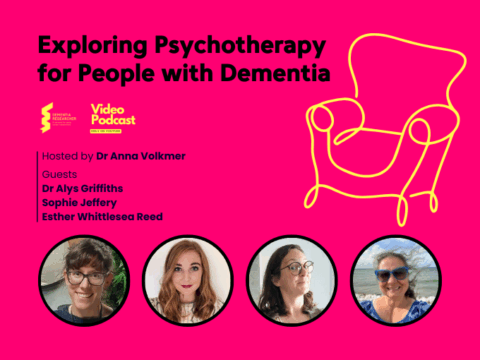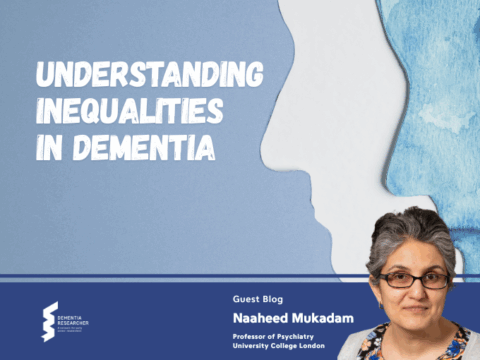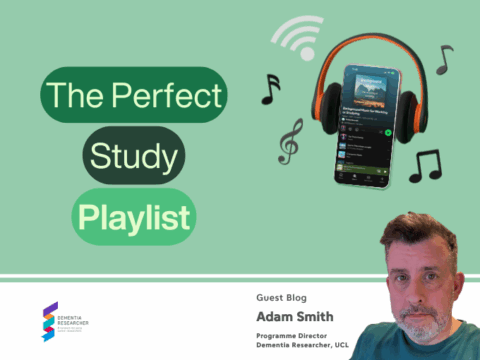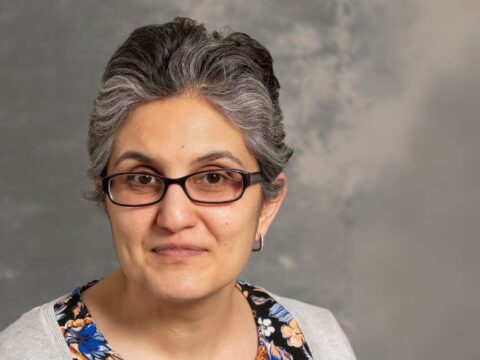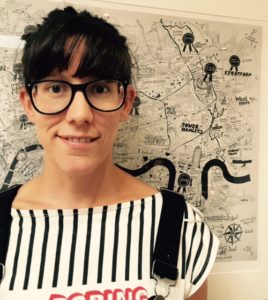 The number of people living with dementia is increasing. This issue, and the impact on the people around these individuals, is widely known and occasionally features in the national tabloid newspapers. What people may not realise is that a large number of people living with dementia will present not with the classic ‘memory’ symptoms but with a language led dementia. This means that many people with dementia will experience difficulties with word finding, articulating sounds and using and understanding long complex sentences (also known as primary progressive aphasia; PPA). These symptoms may have a more significant impact on their daily lives than any other memory or thinking difficulties they may or may not yet have.
The number of people living with dementia is increasing. This issue, and the impact on the people around these individuals, is widely known and occasionally features in the national tabloid newspapers. What people may not realise is that a large number of people living with dementia will present not with the classic ‘memory’ symptoms but with a language led dementia. This means that many people with dementia will experience difficulties with word finding, articulating sounds and using and understanding long complex sentences (also known as primary progressive aphasia; PPA). These symptoms may have a more significant impact on their daily lives than any other memory or thinking difficulties they may or may not yet have.
There have been many advances in the sciences that mean we now understand the dementia disease process much better. What we do not know, however, is how or if we are able to cure it. Thus there are more and more people living with dementia and as a society we are looking for ways to support those people to live well. Speech and language therapy is one such intervention that has the potential to maximise communication, conversation and thus quality of life for people living with dementia.
I qualified as a speech and language therapist (SLT) in 2002. Since then I have worked with adults with acquired neurological communication difficulties across England and Australia. It was when working in Melbourne that I became particularly interested in working with adults with PPA. I found that SLTs would refer people with these types of dementia to our service at the Royal Melbourne Hospital reporting that they were unsure how to work with them. I was surprised, as I had found research evidence describing not dissimilar approaches to those we used with people with post stroke language difficulties (aphasia), particularly naming or word relearning exercises. Consequently I worked with these people and their families using these and many other intervention techniques to support their language and communication (Volkmer, 2013; Marshall et al, 2018).
On returning to the UK in 2010 I started working at South London and the Maudsley NHS Foundation Trust with people with dementia. I found that people with PPA would frequently become fed up with the word relearning therapies, as it required daily practice of words that they felt they would eventually lose anyway. In addition people’s family members would often ask about how they could support their loved ones in daily conversation. One of the most common therapeutic approaches I used focused on conversation training for both the person with PPA and their family members (Volkmer et al, 2015). Better Conversations with Aphasia (BCA; Beeke et al, 2013) is a well-established (it has more than 4,000 followers worldwide) free online conversation training resource, hosted by UCLeXtend website, to support SLTs delivering conversation training to people with aphasia post stroke and their families. Despite this being a common and well evidenced approach for people with aphasia post stroke there was little evidence of this approach in the research literature for people with PPA. BCA has been shown to successfully improve the use of facilitators and reduce the use of barriers in conversations between people with aphasia and their conversation partners (Best et al, 2016). The lack of similar evidence in the area of PPA inspired me to apply for funding to do the research to fill this gap through an NIHR Doctoral Research Fellowship.
The Medical Research Council provides guidelines for complex interventions (Craig et al, 2008), such as speech and language therapy, which includes a rigorous approach to developing and piloting these types of interventions prior to implementing a large scale trial. Consequently my study is divided into three stages to align with the guidelines. The first stage included a UK wide survey of SLTs working with people with PPA and a systematic review of the research literature on functional communication focused interventions for people with PPA and their partners. In the second stage of the project I used the information I had collected to refine the BCA program for use with people with PPA; resulting in the Better Conversations with PPA (BCPPA) program. The third and final stage of the study is a multicentre randomised controlled trial of the BCPPA program across a number of NHS sites in England (currently underway).
In the first stage of my research project I received survey responses from 106 SLTs working with people with PPA across the UK. They reported increasing numbers of people with PPA on their caseloads, yet concerningly they also reported significant barriers to these people accessing speech and language therapy services. Respondents identified restrictive service criteria and a broader lack of awareness of the role of SLTs as the most significant barriers. In terms of clinical practice SLTs reported using communication training approaches often and always in therapy with people with PPA compared to word relearning approaches which they commonly reported using occasionally or never. This further highlighted the gap between the research (the majority of which focuses of the word relearning therapies) and current clinical practice.

Doing the systematic review of the research literature I found 14 studies describing functional communication focused interventions for people with PPA. The majority of these studies were case studies and lacked methodological rigour yet they presented examples of conversation training interventions, communication aid development and compensatory strategies to support activities of daily living such as cooking. These studies presented massive variation in terms of dosage and location or method of delivery. Yet many shared principles such as basing the intervention around the pre-existing strategies the person themselves had started developing and modifying the intervention to suit the needs of the individuals.
Using this information, and working with a steering group (who have accompanied me throughout the course of the project), a draft version of the online BCPPA intervention was created. The draft resource provides a guide for SLTs to work on conversation, by making video recordings of people with PPA with their conversation partners and using this to identify areas of potential conversation breakdown. The therapy itself comprises four therapy sessions, including session plans, therapy materials and activity resources. Therapists work with the person with PPA and their partner to identify facilitators and barriers in their own conversations, and facilitate discussion to set goals to work on maximising the facilitators whilst minimising the barriers. They then practice activities and problem solve the use of these in conversations over the course of therapy. During this stage of the project the BCPPA program was further refined with feedback from SLTs in the Dementia and Mental Health Clinical Excellence Network and advice from people with PPA and their families who participated in a series of focus groups.
Having refined the BCPPA program a randomised controlled pilot study is currently underway across seven NHS trusts whereby local collaborators are inviting people with PPA from their current caseloads to participate in the study with their conversation partners. Should they consent to participate in the study, they are then undergoing a battery of language, conversation, confidence and quality of life measures prior to being randomised to either having the BCPPA or having no SLT input for 4 weeks. After this 4 week period they are then being re-assessed using the same measures by SLT student researchers who are blinded to the allocated condition. The aim of this pilot is to ascertain for a future full trial whether it is feasible to undertake such a study and identify the most appropriate outcome measure, acceptability of randomisation, fidelity of intervention delivery (can all the therapists deliver basically the same intervention) and how many people we need to recruit for such a study.
The pilot study is due to finish in the middle of 2019, with a view to launching the BCPPA program as a free online resource later that year.
Anna Volkmer is a NIHR Doctoral Research Fellow at University College London
To find out more about Anna’s research and to keep a track on developments, you can follow her blog at https://annavolkmersbigphdadventure.wordpress.com/
To discuss this research, you can post a comment or question below and follow Anna on Twitter Follow @volkmer_anna
References:
Beeke, S., Sirman, N., Beckley, F., Maxim, J., Edwards, S., Swinburn, K. & Best, W. (2013). Better Conversations with Aphasia: an e-learning resource. Retrieved from https://extend.ucl.ac.uk/
Best W, Maxim J, Heilemann C, Beckley F, Johnson F, Edwards SI, et al. Conversation Therapy with People with Aphasia and Conversation Partners using Video Feedback: A Group and Case Series Investigation of Changes in Interaction. Front Hum Neurosci. 2016;10. doi:10.3389/fnhum.2016.00562.
Craig P, Dieppe P, Macintyre S, Michie S, Nazareth I, Petticrew M. Developing and Evaluating Complex Interventions: New Guidance. Sci York. 2008;337:a1655. doi:10.1136/bmj.a1937
Marshall, C. R., Hardy, C. J., Volkmer, A., Russell, L. L., Bond, R. L., Fletcher, P. D., … & Fox, N. C. (2018). Primary progressive aphasia: a clinical approach. Journal of neurology, 1-17.
Volkmer A. Assessment and Therapy for Language and Cognitive Communication Difficulties in Dementia and Other Progressive Diseases. North Guilford: J&R Press; 2013
Volkmer, A. & Beeke, S. (2015). How to help couples have better conversations. Journal of Dementia Care, 23(5), 22–24.

 Print This Post
Print This Post
